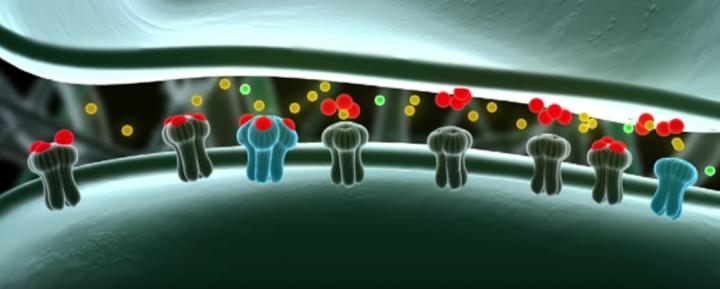Antibodies can be a blessing or a curse to the brain — it all depends on their concentration

Credit: MPG/ Massih Media
If the immune system attacks its own body, it can often have devastating consequences: autoantibodies bind to the body’s structures, triggering functional disorders. The receptors for glutamate, a neurotransmitter, can also become the target of autoantibodies. Researchers at the Max Planck Institute of Experimental Medicine in Göttingen have been investigating the circumstances under which autoantibodies for a particular glutamate receptor – known as the NMDA receptor – are formed, and their effects in the brain. The researchers have discovered that the level of these autoantibodies in the blood can fluctuate considerably over a person’s lifetime – independent of health conditions – and increases with age. Chronic stress can, however, drive up the concentration of these autoantibodies in the blood even in early life. According to the researchers, when the antibodies are able to enter the brain to act on NMDA receptors, people suffer less depression and anxiety. These autoantibodies are clearly acting as the body’s own antidepressants.
Glutamate receptors sit in the nerve cell membrane and bind to glutamate, a neurotransmitter. The NMDA receptor is a receptor type essential for learning and memory. Up to 20 percent of the population have antibodies against this receptor in their blood.
Usually, the blood-brain barrier prevents these antibodies crossing from the blood into the brain. Only if this barrier is damaged can the antibodies have any greater effect. If the antibodies bind to NMDA receptors in the brain, these are then removed from the nerve cell membrane (‘internalized’). This disrupts the signalling to neighbouring cells. If an inflammation is present in the brain, for example, due to a viral infection, the presence of these autoantibodies can lead to a so-called ‘anti-NMDAR-encephalitis’: an illness brought to the public’s attention by the 2016 film ‘Brain on Fire’. The effect of these NMDA receptor autoantibodies can typically influence the symptoms of the underlying encephalitis, contributing to epileptic seizures, impaired movement, psychosis and loss of cognitive function.
Autoantibody levels increase with age
In a new study, Hannelore Ehrenreich and her colleagues from the Max Planck Institute of Experimental Medicine in Göttingen have discovered that the concentration of these autoantibodies in the blood of mice and humans can fluctuate considerably over time. However, the level rises with age, as the body is continually exposed to factors which stimulate the immune system, and with it, autoantibody production. One of these factors is stress. According to the researchers, chronically stressed mice show a higher level of NMDA receptor autoantibodies in their blood compared to their non-stressed conspecifics.
Ehrenreich and her team also analysed the concentration of antibodies in the blood of young migrants. “People who are subjected to high stress in their lives have a greater probability of carrying NMDA receptor autoantibodies in their blood, even at a young age,” says Ehrenreich. These are like a ticking time bomb in the body. “If an infection or some other factor appears which weakens the blood-brain barrier, the autoantibodies enter the brain and can cause epileptic seizures or other neurological disorders,” says Ehrenreich. A good example would be Knut, the famous Berlin polar bear.
Positive effect of antibodies
However, the researchers’ recent study has for the first time indicated that the autoantibodies can also play a positive role in the brain. Mice with a more permeable blood-brain barrier and NMDA receptor autoantibodies in the brain were significantly more mobile and less depressed during times of chronic stress than their conspecifics with an intact blood-brain barrier. An analysis of a large patient database revealed that people with NMDA autoantibodies and a permeable blood-brain barrier also suffered significantly less depression and anxiety.
The NMDA autoantibody obviously plays a role in the brain similar to ketamine, an antidepressant that also acts on NMDA receptors. “The effect of these autoantibodies – whether they contribute to the symptoms of an encephalitis or inhibit depression – is evidently determined not only by their level in the brain, but also by any underlying condition, in particular the presence or absence of inflammation,” explains Ehrenreich.
###
Original publication
Hong Pan, Agnes A. Steixner-Kumar, Anna Seelbach, Nadine Deutsch, Anja Ronnenberg, Daniel Tapken, Nico von Ahsen, Marina Mitjans, Hans Worthmann, Ralf Trippe, Christina Klein-Schmidt, Nadine Schopf, Kristin Rentzsch, Martin Begemann, Jürgen Wienands, Winfried Stöcker, Karin Weissenborn, Michael Hollmann, Klaus-Armin Nave, Fred Lühder and Hannelore Ehrenreich
Multiple inducers and novel roles of autoantibodies against the obligatory NMDAR subunit NR1: A translational study from chronic life stress to brain injury.
Molecular Psychiatry; DOI: 10.1038/s41380-020-0672-1
Published: 24 February 2020
Media Contact
Hannelore Ehrenreich
[email protected]
49-551-393-899-628
Original Source
https:/
Related Journal Article
http://dx.




